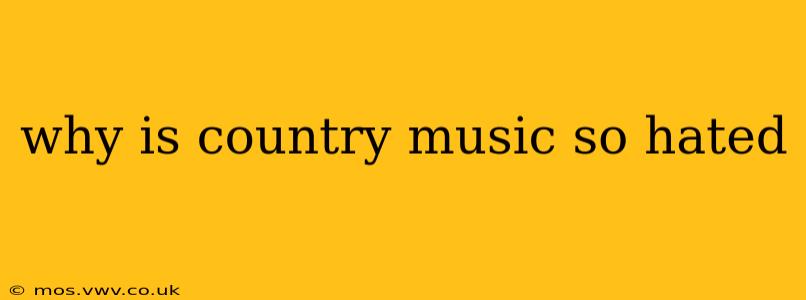Why Is Country Music So Hated? Deconstructing the Genre's Divisive Appeal
Country music, with its roots in the American South, boasts a rich history and massive global following. Yet, it also faces a significant amount of criticism and even outright disdain. The question "Why is country music so hated?" isn't easily answered, as the reasons are complex and multifaceted. It's not simply a matter of personal preference; deeper societal and cultural factors contribute to the genre's divisive nature.
What are some common criticisms of country music?
One common criticism revolves around the perceived lack of originality and repetitiveness in modern country. Many argue that contemporary country has strayed too far from its traditional roots, becoming formulaic and commercially driven. The frequent use of similar lyrical themes (trucks, beer, heartbreak), predictable melodies, and a focus on auto-tune can leave listeners feeling uninspired and bored. This is a valid criticism, particularly when compared to the rich storytelling and diverse instrumentation of earlier country eras.
Is country music always about trucks and beer?
While the "trucks, beer, and heartbreak" trope is a prevalent stereotype, it's an oversimplification. Country music, at its core, is about telling stories – stories of everyday life, love, loss, hardship, and resilience. However, the mainstream commercialization of the genre has arguably led to an overemphasis on these easily digestible themes, overshadowing the more nuanced and complex narratives that are also part of its tradition.
Does country music lack diversity?
Another significant criticism centers on the lack of diversity within the genre, both in terms of artists and themes. For many years, country music has predominantly featured white male artists singing about experiences that don't always resonate with listeners from different backgrounds. This lack of representation can create a sense of exclusion and contribute to the negative perception of the genre. Fortunately, there's a growing movement towards greater inclusivity, with more female and minority artists gaining recognition and challenging the traditional country landscape.
How has country music changed over time?
The evolution of country music is a long and complex one. Its transformation from its folk and blues roots to the more polished and commercial sound of today has resulted in a clear divide among listeners. Some long for the simpler instrumentation and raw emotion of earlier country, while others find the modern sound more accessible and enjoyable. This generational gap contributes significantly to the polarized opinions surrounding the genre.
Is the criticism of country music justified?
Whether the criticism is "justified" depends entirely on individual perspective and what one values in music. While the criticisms regarding formulaic songwriting, lack of diversity, and commercialization are valid points to consider, many still find immense enjoyment and connection in country music. The genre's emotional resonance, storytelling capabilities, and comforting familiarity remain powerful draws for its loyal fanbase.
Ultimately, the perceived "hatred" of country music is less about objective quality and more about subjective taste, cultural factors, and the genre's own evolution. Understanding these complexities allows for a more nuanced perspective on this often-debated topic.
